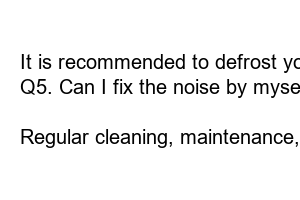냉장고 소음 원인
Title: Noisy Fridge Troubling You? Here’s What You Need to Know
Introduction:
Are you frequently disturbed by the unusual sounds emanating from your refrigerator? A noisy fridge can be a nuisance, causing worry and frustration. In this blog post, we will explore the common causes of refrigerator noise and provide you with practical solutions to help you alleviate the problem.
1. Improper Leveling: Is Your Fridge Standing Straight?
One major reason behind refrigerator noise is improper leveling. When your fridge is not levelled correctly, it causes vibrations and rattling sounds. Ensure that your refrigerator is standing straight on the floor to eliminate unnecessary noise.
2. Unbalanced Fan Blades: Are They Whirling in Harmony?
Unbalanced fan blades can generate a loud buzzing or humming noise. Regular cleaning and maintenance can help prevent the accumulation of dust and debris that can throw the blades off balance. A well-maintained fan ensures proper cooling and eliminates unnecessary noise.
3. Faulty Condenser Fan Motor: Is It Running Smoothly?
A defective condenser fan motor can lead to a grinding or screeching sound. This motor circulates air through the condenser coils, and a malfunction can cause refrigeration issues as well. In such cases, seeking professional assistance is crucial to resolve the problem efficiently.
4. Worn-out Compressor: Is It Giving You That Clattering Noise?
The compressor is the heart of your refrigerator, and constant use over time can lead to wear and tear. A failing or worn-out compressor can create rattling or clattering noises. It is advisable to consult a technician to evaluate the compressor’s condition and determine whether a repair or replacement is required.
5. Overworked Evaporator Fan Motor: Is It Whirring Too Loudly?
An overworked evaporator fan motor can produce excessive noise, disrupting the peace in your kitchen. This motor facilitates airflow in the freezer and refrigerator compartments. Regular maintenance and cleaning play a vital role in reducing strain on the fan motor, ensuring its smooth operation.
6. Refrigerant Flow Issues: Are Your Pipes Causing That Hissing Noise?
A refrigerant leak or restricted flow can result in hissing or gurgling sounds. Although refrigerant-related issues are less common, they can still contribute to refrigerator noise. Hiring a professional is crucial, as it requires expertise to detect and resolve such problems.
7. Frost Buildup: Do You Hear Crackling Noises?
Excessive frost buildup on the evaporator coils can lead to a crackling or popping noise. This occurs when the refrigerator defrosts and the ice melts, causing a disturbance. Regular defrosting or investing in a frost-free refrigerator can eliminate this source of noise.
Summary:
A noisy refrigerator can disrupt your household’s peace and indicate potential issues within the appliance. By addressing common culprits such as improper leveling, unbalanced fan blades, faulty components like the condenser fan motor or compressor, and overworked evaporator fan motor, you can significantly reduce the noise. Additionally, paying attention to refrigerant flow issues and avoiding excessive frost buildup will help maintain a quiet and efficiently running fridge.
FAQs:
Q1. Why is my fridge making a buzzing noise?
A buzzing noise typically indicates unbalanced fan blades or a faulty condenser fan motor. Regular maintenance and cleaning can help resolve these issues.
Q2. Should I repair or replace a noisy compressor?
Consulting a professional technician is essential to evaluate the compressor’s condition. They can advise you on whether a repair or a replacement is the best course of action.
Q3. What should I do if my fridge is making a gurgling noise?
Gurgling noises might be due to refrigerant flow issues or a refrigerant leak. Reach out to a professional technician to diagnose and fix the problem.
Q4. How often should I defrost my refrigerator?
It is recommended to defrost your refrigerator once the frost buildup reaches a thickness of ¼ inch to avoid excessive noise and maintain its efficiency.
Q5. Can I fix the noise by myself, or should I call a technician?
While some simple maintenance tasks can be done by yourself, it is advisable to seek professional help when dealing with complex issues or when in doubt.
Q6. How can I prevent future noise problems?
Regular cleaning, maintenance, and prompt attention to any unusual noises are key to preventing future refrigerator noise.

